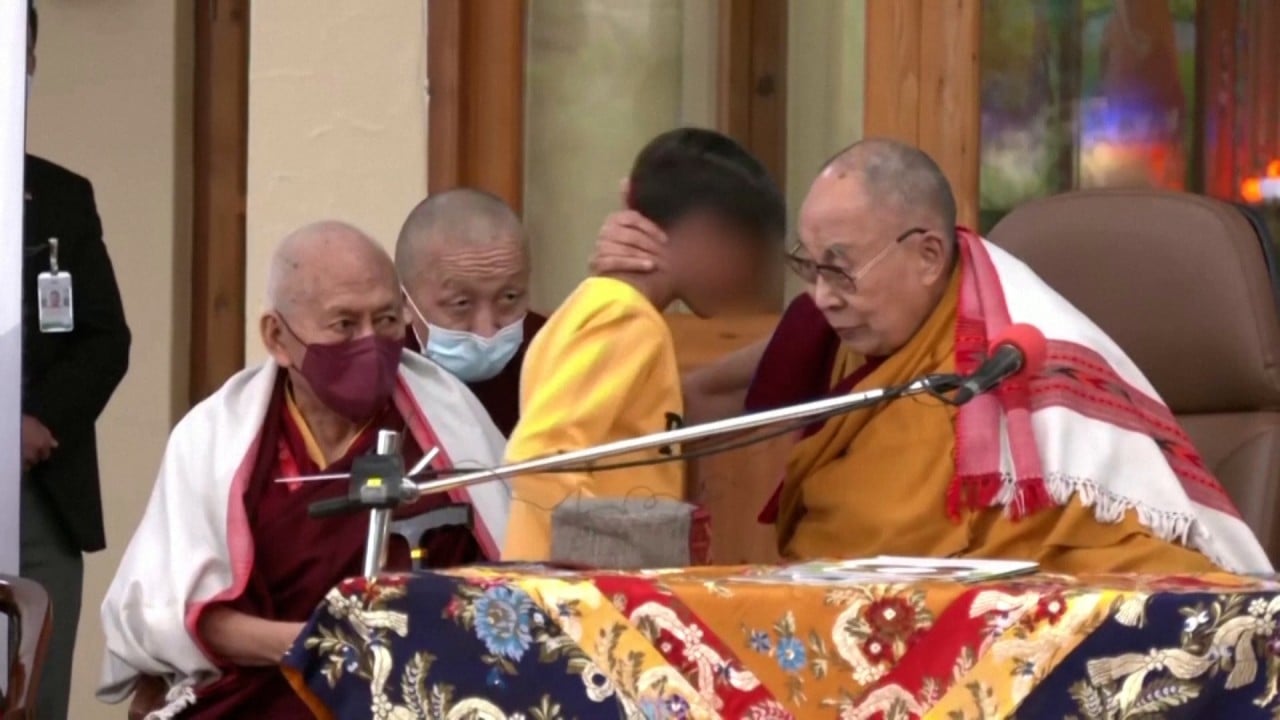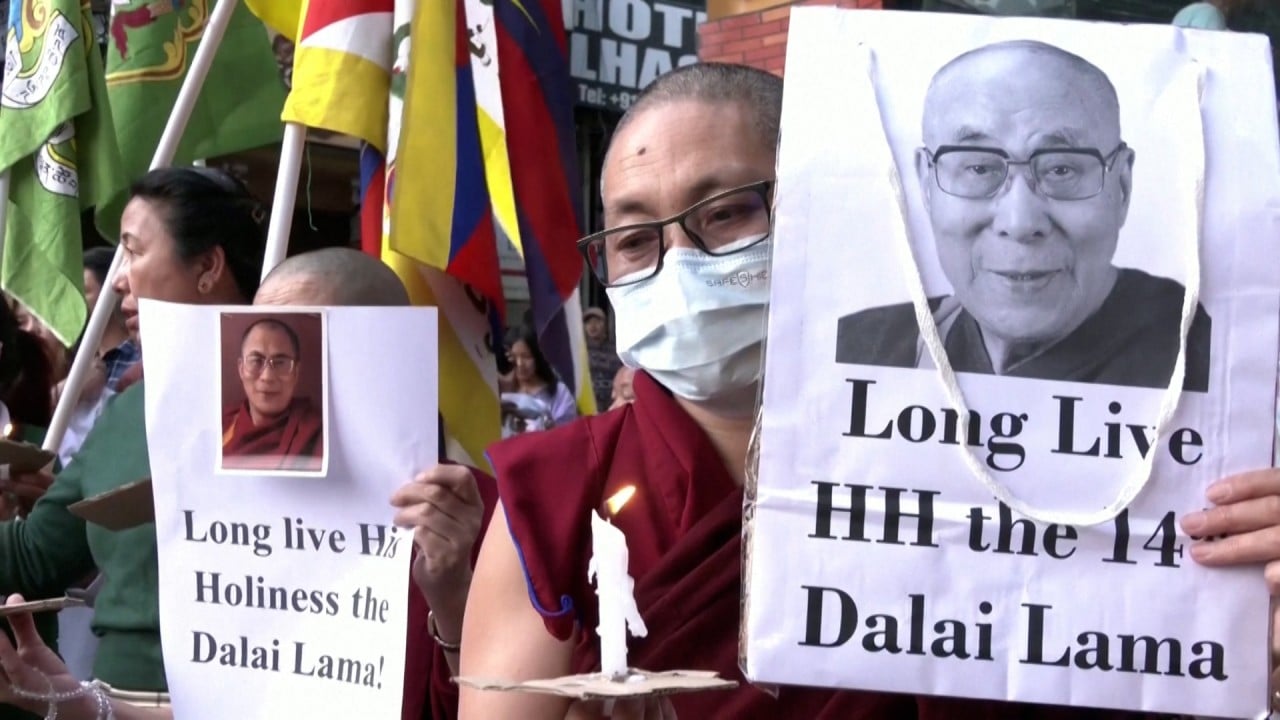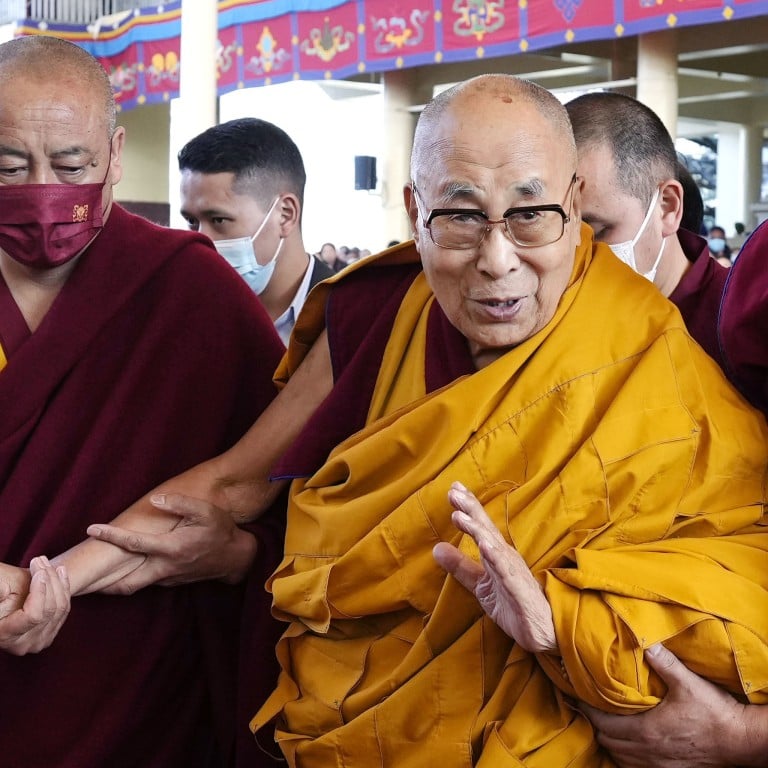
Dalai Lama asking a young boy to ‘suck my tongue’: a Tibetan tradition or abuse?
- The video sparked outrage online, with many social media users terming the Tibetan spiritual leader’s behaviour as ‘creepy’ and ‘disgusting’
- Tibetans are dismayed by the ‘attacks’ and say their culture has been misconstrued and hypersexualised to create a false narrative against the Dalai Lama
In the clip, the Dalai Lama is approached by a boy – whose identity remains unknown – for a hug. He then asks the child to kiss him on the cheek, holds the boy’s chin and kisses him on the lips. He then says “suck my tongue” and sticks his tongue out. The crowd laughs and the leader hugs the child again.
The incident happened at an event in February in the northern Indian city of Dharamsala, from where the Dalai Lama has been running a government-in-exile since 1959.
Dalai Lama apologises for asking boy to suck his tongue
After the video spread like wildfire – with many social-media users terming his behaviour as “inappropriate”, “creepy”, “disgusting” and “alarming” – Tibetans across the world have come together to share feelings of dismay and distress, stating that the video had been misinterpreted by people with no understanding of their culture.
Bangalore-based journalist Tenzin Pema, in a long social-media post, said Tibetan culture had been misconstrued and hypersexualised to create a false narrative against the Dalai Lama.
She pointed to some gestures and customs that might be unknown to the rest of the world but were considered by Tibetans to be “pure unadulterated acts of love, faith, and compassion”. Examples include the oothuk, where two people put their foreheads together, and the po – a kiss on the lips given by elders to children and vice versa – as signs of respect and love.
The words nge che le jip were a common, playful refrain by Tibetan elders and innocent-sounding in Tibetan but did not seem that way when translated into English as “suck my tongue”, she said.
Sticking one’s tongue out is a show of respect or agreement and frequently done as a greeting by Tibetans, a tradition which dates back to the 9th century, according to a report by the Institute of East Asian Studies at UC Berkeley.
Pema said people were superimposing their own negative experiences on what happened in the video. “In such an instance, even the sight of a grandfather kissing his own grandson will be misconstrued as child abuse,” she said.
The Tibetan leader, who became the Dalai Lama at age four, fled to India in 1959 when he was 23 after a failed uprising against Chinese occupation in the Tibetan capital of Lhasa. His followers have remarked on his “playful manner” and “childlike” demeanour.
The Dalai Lama, however, is no stranger to controversy.
In 2018, he said India and Pakistan would have remained unified had Mahatma Gandhi’s ambition for Muhammad Ali Jinnah to become India’s first prime minister come true. He blamed Jawaharlal Nehru’s “self-centred attitude” for this not happening.
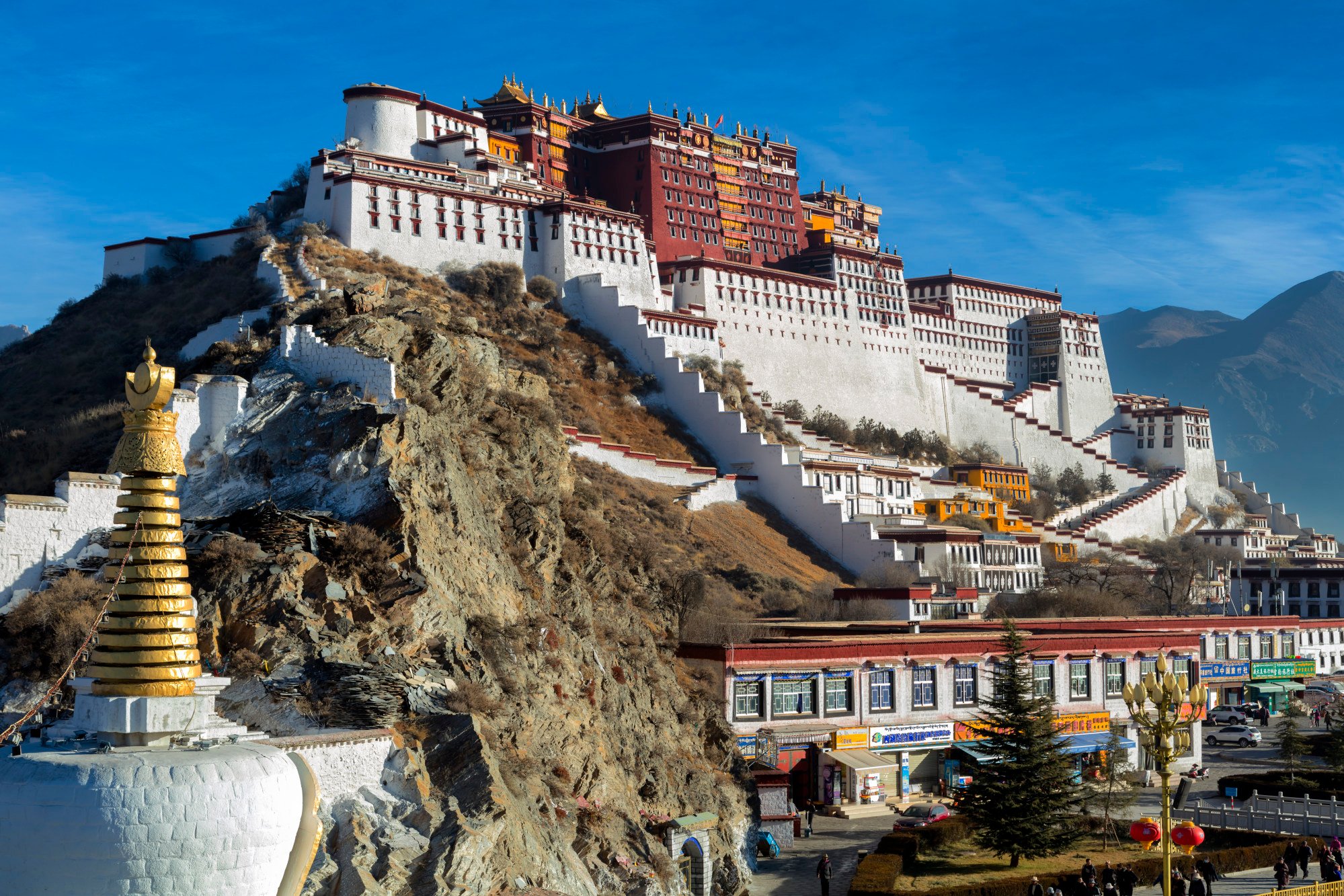
In a 2019 interview with the BBC, he said any future female Dalai Lama should be “attractive”. His office later apologised for his remark. That year, he sparked outrage again when he said “Europe belongs to the Europeans” when referring to immigrants.
A 2016 clip featuring the leader with US singer Lady Gaga was also stoking the current outrage, with the Dalai Lama seen touching one of the singer’s legs at a conference in Indiana. She grabbed his hand to stop him when he attempted to touch her other leg.
Controversies notwithstanding, the consensus among Tibetans interviewed by This Week in Asia was that the present furore was down to “misinterpretations and misperceptions”.
Will Tibetans’ ‘middle way’ approach to China ties keep peace in the region?
In the northern Indian hill town of McLeod Ganj, regarded as the de facto capital of the Tibetan community, residents were dismayed that their culture had been viewed through a sordid lens.
The reactions over the video of the boy were “blown out of proportion”, said one Tibetan resident, on condition of anonymity. She viewed the furore as a direct attack “on the Tibetan faith, ethos, culture and way of life”.
Kunsang Tenzing, the founder of Stories Of Tibetans, a digital archive of Tibetan oral history, said that those who attacked the Dalai Lama – a man whom Tenzing described as a “father-like figure to all Tibetans” – did not understand Tibetan culture.
“It is important to double-check traditions, customs and practices,” he said.
Dr Lobsang Sangay, former Sikyong (political leader) of the exiled Central Tibetan Administration, highlighted the cultural differences between Tibetan and Western societies.
“Tibetans would say ‘that boy is so lucky, he got a hug from His Holiness and a kiss’. But from Western or other perspectives, [it] was politically incorrect,” Sangay said.
Some Tibetans have also claimed that the video is being exploited by Chinese Communist Party sophists to embarrass the Dalai Lama and legitimise China’s control over Tibet.
Penpa Tsering, the current Sikyong of the Central Tibetan Administration, said investigations revealed that the “initial instigators were pro-Chinese sources”, which would explain the “motivation” behind the clip going viral.
“It needs no explanation as to who would gain from maligning the image, reputation and legacy of His Holiness. The political angle of this [orchestrated smear campaign] cannot be ignored,” he added.
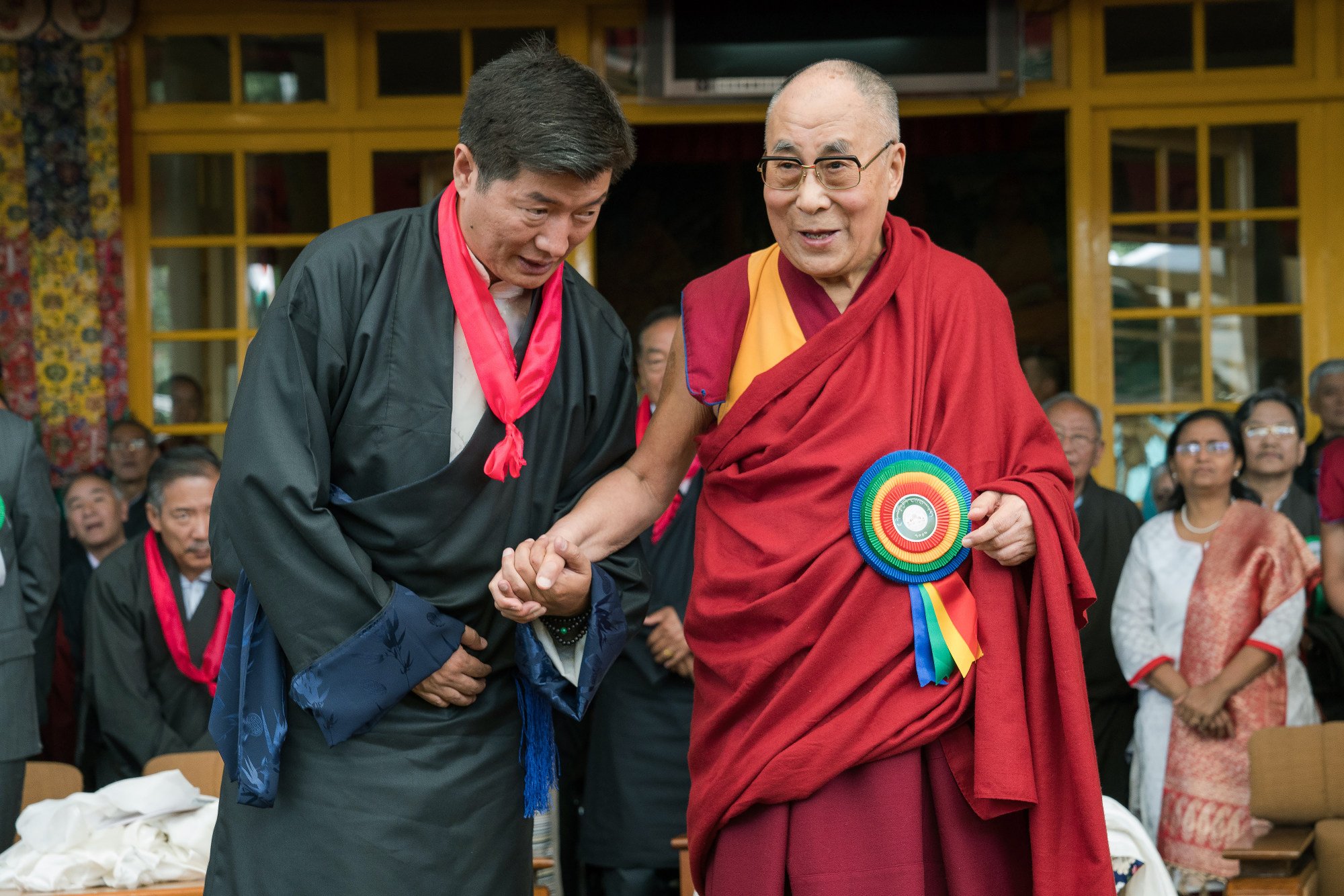
Earlier this week, the Dalai Lama’s press office issued an apology. “His Holiness wishes to apologise to the boy and his family, as well as his many friends across the world, for the hurt his words may have caused,” the statement said. “His Holiness often teases people he meets in an innocent and playful way, even in public and before cameras. He regrets the incident.”
However, Pema insisted that “no apology was ever needed” from the Dalai Lama. Instead, the world should apologise to the spiritual leader and the Tibetan community for the “unwarranted assault … on everything we hold dear”.
“The attacks on His Holiness and the ease with which so-called ‘woke’ people have jumped to conclusions have been deeply hurtful for me and millions across the world,” she said.


